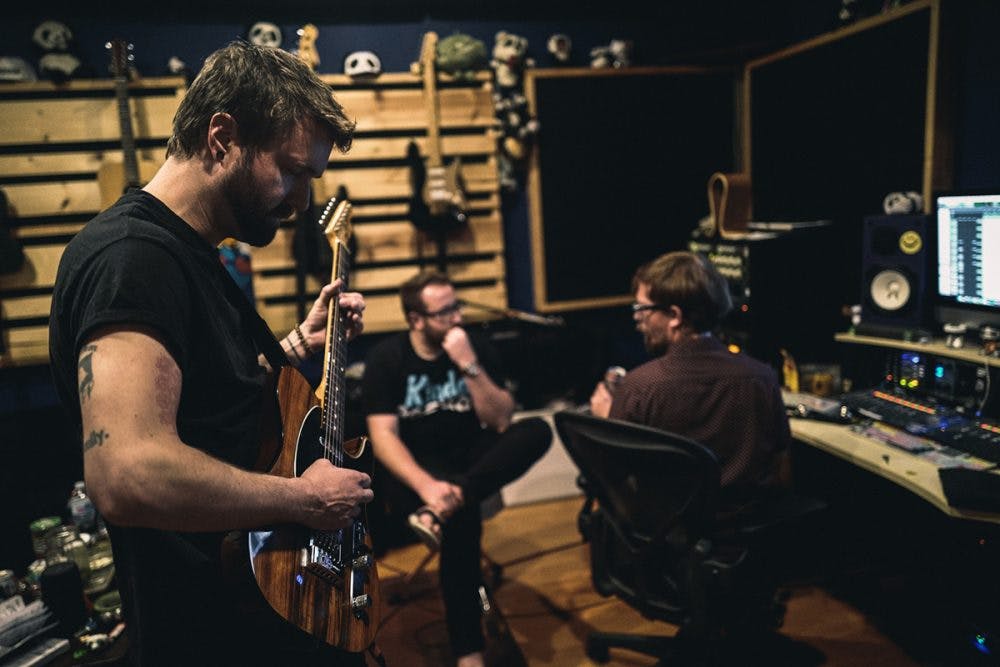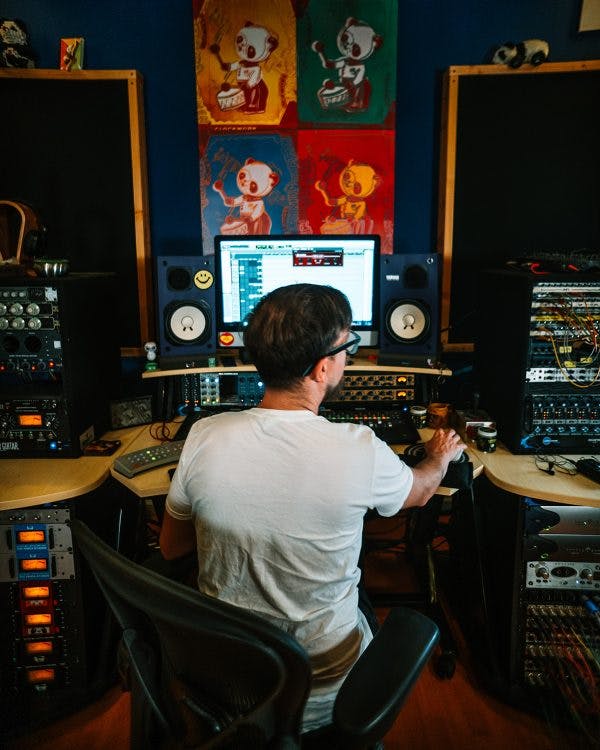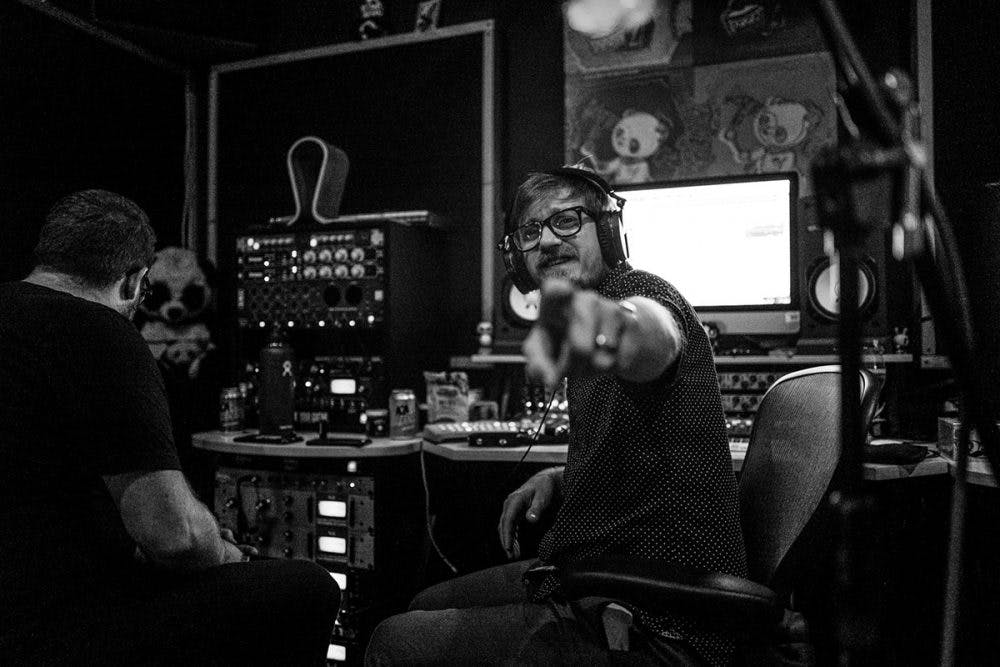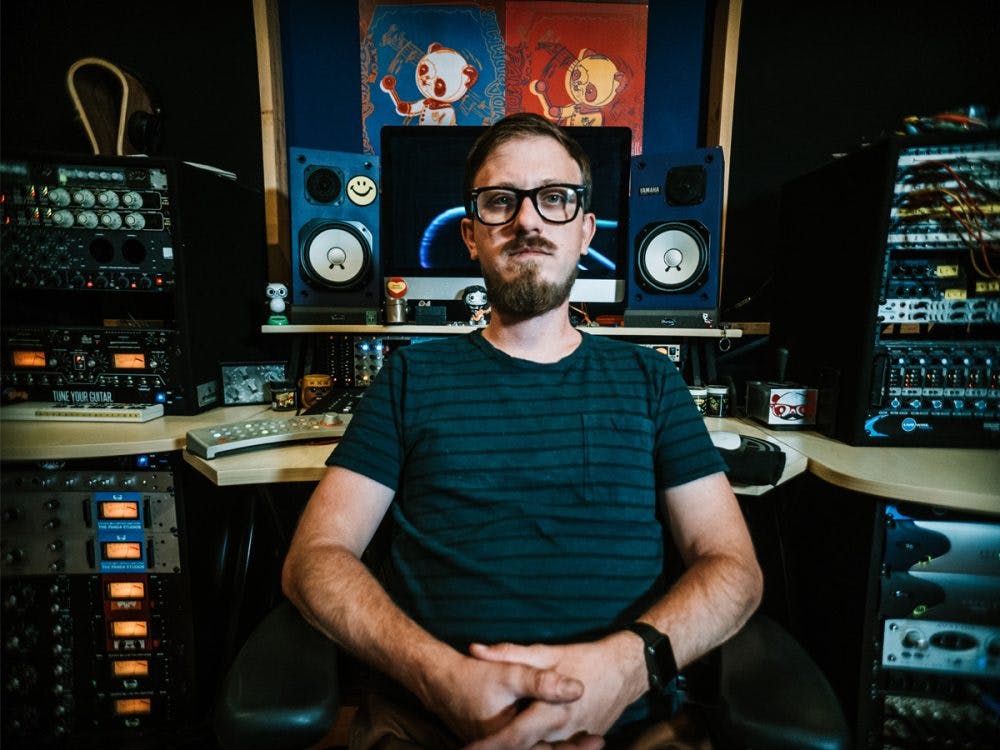One recent evening I had the pleasure of speaking with Sam Pura about creating music. Sam and I spoke at length about his philosophies and techniques that have shaped the more than 100 projects he has worked in just the past few years. During our conversation, Sam’s exuded the same energy one feels from his musical productions. He is relentlessly intense and constantly moving in different directions, but also very much in the moment, focused and aware of the details around him. Music consumes most of Sam’s waking life–it would have to in order for him to produce more than 20 projects per year!
For those who aren’t familiar with Sam, he grew up across the bay from San Francisco, played guitar in “spastic-punk” bands, like Heavy Heavy Low Low, and opened a studio in East Oakland, where he engineered and produced punk and metal bands. Ultimately, Sam built The Panda Studios, his home base, in Fremont, California. There he has produced, engineered and mixed records by The Story So Far, Hundredth, State Champs, Basement, etc. Sam is often pigeon holed in the pop-punk world, but his productions range from metalcore to emo, with his musical sweet spot featuring energetic grooves, heavily layered high-gain guitars, and up-front vocals.
Besides producing music, Sam has a large presence on YouTube with The Panda Studios’ channel and plenty of guest features on vlogs like URM Academy’s Nail the Mix.
Sam grew up playing guitar, but he describes himself as obsessed with drums. In his words, “If you’re going to make records, you have to be obsessed with drums, right? I used to be the guitar player in bands, but I was obsessed with making sure that the band sounded good while recording. I really like tweaking drum tones and tweaking guitar tones. It was, like, this all makes sense to me here, so after I recognized that, I got a [Pro Tools] 002 rig and started recording and people were blown away at how good my demos sounded.”
Let’s let Sam get into his own story, in his own words…

You seem very comfortable with the tech side of production, but also driven by the artistry. How do you blend the two brains?
I went to school and, fortunately, I got to learn on tape machines and SSL consoles and Neves and shit like that, so signal flow is extremely important to me and so I respect the ability to capture really good audio from the start. Like, how do I make it sound perfect before it comes into my computer? So that’s how I am technically, but creatively I’m very punk. Like in school we’re taught not to go past 3 dB of compression or this much EQ or something, and those are the rules I love to break. I never look at meters, I never even care, you know. I completely follow my ears.
You seem to work with a lot of independent bands, instead of major label work. How do you choose your projects?
I hate working for record labels. It’s the lowest budget projects I do and it’s the most irrational times. It’s gotta be aligned with three things. It’s gotta be: one, spiritually fulfilling; two, creatively fulfilling; and three, financially fulfilling. Like, it’s gotta be two of the three–like the whole “fast, cheap, good” thing. As long as I have two them, I’ll do the record. With most label things it’s not financially fulfilling; it doesn’t become creatively fulfilling; and it’s definitely not spiritually fulfilling. It just doesn’t really work out half the time. Whereas the new The Dangerous Summer record I did is spiritually and creatively fulfilling and that’s awesome. Content speaks loudly, and as long as you make good content bands will come here to work. A lot of L.A. bands come up to me because they want me to be involved in their content. They like my thumbprint that I have on the records where they found me out. That makes me dive further into my thing.
Basically, anytime I have a strong imprint on bands and am making heavy decisions, those are the bands that people immediately respond to. When I listen to music, I want to feel an emotional impact–an emotional relationship with the speakers. All of a sudden I’m just lost in the flow zone, if you know what I mean. If I can get to a point where I’m like “that’s the best thing I’ve ever heard in my life,” then the people around me are like “that’s fucking genius!” It’s not that I’m always right, it’s that I’m more passionate about music than anyone else I know. I dedicate fourteen hours a day to making music and that translates and resonates with people. It’s the band’s songs, but it’s my recording, you know what I mean? I make bands dive down to find the sounds and music that inspire them and I help them to be bigger than who they are.
I see you have a lot of repeat business, producing multiple albums for the same band over time. What leads to that?
The bands that basically go out and tour the world and want to make it count–those bands are usually pretty aligned with where I’m trying to go. And then you have the other bands that are, like, they just wanna play shows and be perceived as a famous rock band. Those bands I don’t really get along with. Maybe I seem delusional to them to insinuate that maybe they should try to write better songs! The ones who are dedicated, passionate songwriters–we see eye to eye. They see me as a necessary component in their workflow.
One of the things that strikes me when listening to your productions is how many layers of guitars make up the arrangement, but all the parts have clarity and their own space and location in the mix. How do you create your guitar tones?
Everything I do is DI first, and also I’m a firm EverTune user, so I’ve got everything EverTuned at my studio. When I started looking up the production on records that I’ve gravitated towards, it was, oh, they bi-amped and they’re like using multiple different guitars to get different levels of texture. When I started doing that, that’s when I was like “oh that’s just how you do it.” But then you get into the whole phase anomalies and tuning issues, etc. And then the band wants to change parts… and then you realize the song sucks… and then you’re committed to these takes. So that’s just why everything is just Evertuned and DI’d first.
Wow – that seems like it would drive the bands crazy, not hearing the ultimate sound as they play. What’s your path for DI and reamping?
It does bother players for a while, until they understand where I’m coming from. It’s just straight up guitar into the Eric Valentine UTA guitar cable, and then that goes straight into an Avalon [U5] DI and that’s it. I usually don’t monitor with any amplifier software or anything. Then once everything is done, every guitar goes back through two amplifiers, simultaneously. For reamplng, I have a [Little Labs] PCP Distro box and I’ve also been using this custom reamp box that I built using a design that Eric Valentine was so nice to share with me. Then there’s a [Shure] SM57 on the big cab and a [Beyerdynamic] M160 on the small cab, so there’s like dirty and clean-ish, heavy and textured. From there I add some room mics from my hallway and that’s my guitar tone.
Besides your method of guitar recording, what other recording techniques are you stuck on?
I’m back to [Shure] SM7 on vocals, which always works, and I keep a Cathedral Pipes Notre Dame tube mic on mono drum room all the time.
I really like that you’re not afraid of ambience on vocals when you feel it’s appropriate. So many pop records today keep vocals so dry–maybe because vocal effects are tricky for a lot of people.
It’s a lot of Space Echo–the analog [hardware] Roland Chorus Echo. I was always like “how do those famous mixers time the echo so right?” Once I dialed in the sound-on-sound repeat and timed the repeats perfectly–I wouldn’t have thought to time the echo so perfectly–but once I discovered that, I was like, alright! This is my fucking shit Other than the Chorus Echo, it’s the [Waves plugins] Abbey Road Reverbs, the ADT and the Abbey Road Chambers. I love the Beatles and I’ll throw those into my vibe and that’s pretty much it–there’s nothin’ else going on.
After you’ve tracked, you are mixing in-the-box with Pro Tools. Do you supplement your in-the-box mix with any outboard gear?
So for mix it’s always the C2 [Alan Smart hardware compressor] on mix bus, [hardware] Distressors on drum bus, and maybe I’ll have the space-echo going, too, but that’s pretty much it. Anything else that I use for individually channels, I usually print. Once I put a C2 on my mix I was like “wow, this is like an Andy Wallace mix. This is sick.” I’m always 3:1 [ratio], 30 ms on the attack and auto release. I would go faster on the release cuz the low end sounds better, but it sounds harsh sometimes, so I stay in auto [release]. There is no parallel compression, only serial compression, and I’m hitting all my compressors hard. That’s just how things sound good to me.
I have two [Avid] Artist Mix packs, that are so crucial to my entire workflow, cuz I’m always fucking with levels with those–like how hard I’m hitting the Distressors or the mix bus. I’m constantly riding levels into my compressors.

You love to mix on Yamaha NS10s, as opposed to more full-range, modern sounding speakers. How does that work for you?
All NS10! I feel like all the modern speakers give you all this low end and people feel like it’s big and they just stop mixing and then the mix totally sucks. When I listen to Dr. Dre, or Jaycen Joshua, or MixedbyAli stuff–their low end is great. What do they all have in common? NS10s and Brian fucking “Big Bass” Gardner. And that’s why he’s my mastering engineer. These are the low ends that I’m after. They all use NS10s and this guy, so that’s what I’m gonna do. I use NS10s in both my rooms. Put Sonarworks on them and your golden. I turned off Sonarworks yesterday and the mids of the NS10s sounded static-y and fuzzy. Then once I turn it on, everything sounds correct. I was skeptical about Sonarworks at first, but I’m a firm believer in it now. When I went to Canada to work I brought my Sonarworks measurement mic with me and shot the room and it was killer.
For headphones, I recently used the Shure 1540 headphones and they were amazing. I could wear those for eight hours a day without an issue.
Where do you stand on analog tape and vinyl records?
As for vinyl, I’ve never sat down to listen to it and though “wow.” Recently, I used a ¼-inch analog four-track tape machine and printed from Pro Tools to the tape and back to Pro Tools. Dude, that was the easiest record to mix! I’m a firm believer in analog tape. Being able to mix from tape is probably the coolest thing in the world, but I’ve never approached the area where I can consider that financially. Doing the tape thing with a bunch of plugins does not sound the same.
Finally, what kind of advice would you give to a young producer, engineer or music maker?
The short answer is to maybe… find yourself, haha! There is a spiritual component to this that 90% of the people don’t understand. I meet a lot of young people who are interested in working in the studio and around music, but they don’t get it. First, go figure out how to be self-aware and how to make music that has an emotional impact on people.

Music is not just something we listen to–it’s something we experience!
Sam Pura
For more info about Sam Pura, visit The Panda Studios website at www.thepandastudios.com.




